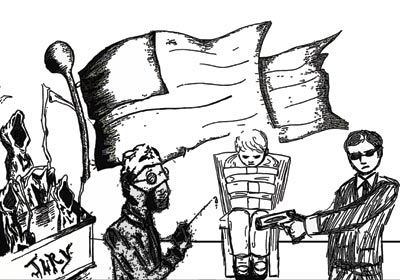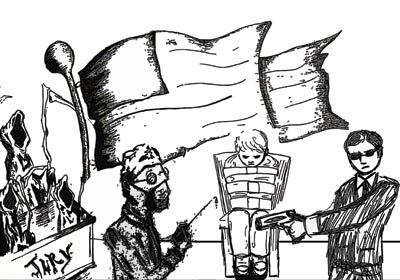
A jury has sentenced Kraig Kahler to death because of his actions in killing his two daughters, estranged wife and her mother.
On Oct. 11 a judge will determine whether evidence in the case supports the use of the death penalty, or whether Kahler will receive life imprisonment without parole.
However, the concept behind the death penalty is flawed, as there is no difference between murdering and condemning someone to death. What good does it do to commit the same act against Kahler as he did to his family? This “eye for an eye” mentality is a logical fallacy. No moral or practical justification exists to support the death penalty.
The death penalty is the ultimate punishment, as terminating life is absolute. However, those who the jury condemns are not always guilty. A jury is not infallible; no mystical force endows them. They, like everyone else, are still human, which means they make mistakes.
Former Sen. Russ Feingold (D-WI), when introducing the “National Death Penalty Moratorium Act of 2000” April 26, 2000, noted that one in seven executed men are innocent, which calculates to about a 15 percent error rate.
In science, one can only accept a hypothesis if there is a five percent chance of error or less; the death penalty is at nearly three times that amount. Thus, it is necessary to reject the hypothesis that the jury is correct in its sentencing. Also, this process is meant for questions like “Is a flipped coin fair?,” not something as important as human life. Even if the condemned are guilty beyond doubt, that still does not justify their deaths.
Life is one of the three inalienable rights outlined in the Declaration of Independence. The idea of the death penalty conflicts utterly with this concept; how can America be indifferent to condemning men to die when it espouses life and liberty?
Now, if there were some foolproof way of deciding and delivering the death penalty, its use may be acceptable. However, the entire system hinges on a group of 12 randomly chosen people who only have to know “beyond reasonable doubt” that the condemned is guilty. In a case which involves the death penalty, though, it needs to be “beyond the shadow of doubt” — to the point that there is no question that the accused is guilty. Once someone is executed, mistakes cannot be corrected. We cannot revive the dead. It would be better simply to imprison criminals for the rest of their lives, as paying those costs are cheaper than going through the process required to sentence them to death.
The costs an average taxpayer pays for the execution of a criminal are shockingly high; each year at least $137 million is spent on the death penalty system. In a standard trial where the death penalty is on the line, the process is astonishingly tedious. According to Richard Dieter, the Executive Director of the Death Penalty Information Center in his testimony to the Judiciary Committee of the Colorado State House of Representatives Feb. 7, 2007, there is a lengthier pre-trial period, an additional number of expert testimonies, about double the number of attorneys and an extremely lengthy appeals process as well as two trials to top it off in every capital case.
If the accused is poor, there will be court-appointed attorneys paid for by the people. The longer trial time means more paid hours for the judge and the jury, paid for by the people.
The appeals process means the Federal government uses additional resources to keep the prisoner on death row, and more judges get extra working hours, paid for by the people.
All of this is wrong. The state should not have the right to take the life of another. With no real system and foolproof process behind it, the death penalty simply becomes a tool for retribution. There is no need for the death penalty, as revenge should never be a motive for a just body of law to condemn men to die.
By The Rock
LATEST NEWS
- Stress, anxiety skyrocket as students prepare for upcoming AP tests
- RBHS holds successful night of percussion
- Not even water?
- Solar eclipse to pass through Missouri, April 8
- How CPS is organized: a guide
- City of Columbia to hold school board election April 2
- Youth Election Participants to assist in upcoming municipal election
- City of Columbia hosts first Community Engagement Session for McKinney Building, hopes to gain public insight on the structure’s future
- RBHS Track Team Opener at Battle Gallery
- March Mathness Photo Gallery
Death penalty amiss: No moral, practical reasons
September 23, 2011

Art by Kelly Brucks
Leave a Comment
More to Discover
@2021 - www.bearingnews.org





















































































